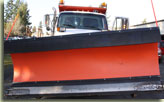|
Although periods of extreme cold cannot always be predicted far in advance, weather forecasts can sometimes provide you with several days’ notice. Listen to weather forecasts regularly, and check your emergency supplies whenever a period of extreme cold is predicted. If you plan to use a fireplace or wood stove for emergency heating, have your chimney or flue inspected each year. Ask your local fire department to recommend an inspector, or find one in the yellow pages of your telephone directory under “chimney cleaning.” Also, if you’ll be using a fireplace, wood stove, or kerosene heater, install a smoke detector and a battery-operated carbon monoxide detector near the area to be heated. Test them monthly, and replace batteries twice a year.
If you have pets, bring them indoors. If you cannot bring them inside, provide adequate shelter to keep them warm and make sure that they have access to unfrozen water. |
Black Diamond Public Works
Monday through Friday
8:00 a.m. - 4:30 p.m.
24301 Roberts Drive
PO Box 599
Black Diamond, WA 98010
Phone: (360) 886-5700
Fax: (360) 886-2592
After Hours Emergency Pager: (253) 333-5555
EMERGENCY SUPPLIES:
To be prepared in the event of a winter storm or power outage, it is recommended that you have the following items on hand:
- Flashlights and extra batteries
- Battery-operated radio and extra batteries
- Emergency non-perishable foods that do not require refrigeration
- Non-electric can opener
- Bottled water
- One week supply of essential medicines
- Extra blankets and sleeping bags
- First aid kit and manual
- Fire extinguisher
- Emergency heating equipment, used properly
IF THE LIGHTS GO OUT:
If you lose electrical service during the winter, follow these tips:
- Call your utility first to determine area repair schedules. Turn off or unplug lights and appliances to prevent a circuit overload when service is restored. Leave one light on to indicate power has been restored.
- To help prevent freezing pipes, turn on faucets slightly. Running water does not freeze as quickly as standing water.
- Protect yourself from carbon monoxide poisoning:
- DO NOT operate generators indoors; the motor emits deadly carbon monoxide gas.
- DO NOT use charcoal to cook indoors. It, too, can cause a buildup of carbon monoxide gas.
- DO NOT use your gas oven to heat your home; prolonged use of an open oven in a closed house can create carbon monoxide gas.
- Make sure fuel space heaters are used with proper ventilation.
- Keep refrigerator and freezer doors closed as much as possible to help reduce food spoilage.
|
.
|
Take the time now to get your home ready for the winter season by following these tips:
- Have your heating system checked annually by a professional. This will ensure that your system is working safely and efficiently which, in turn, will save you money. If you heat by wood, clean your fireplace or stove. Have your chimney flue checked for any buildup of creosote and then cleaned to lessen the risk of fire.
- Make sure your home is properly insulated. If necessary, insulate walls and attic. This will help you to conserve energy and reduce your homes power demands for heat.
Caulk and weather-strip doors and windowsills to keep cold air out.
- Install storm windows or cover windows with plastic from the inside. This will provide an extra layer of insulation, keeping more cold air out.
- Inspect and flush your water heater.
- Clean gutters. Leaves and other debris will hamper drainage.
- Replace batteries of smoke, heat and carbon monoxide detectors. If you did not do it when you set the clocks back, do it now.
To prevent the mess and aggravation of frozen water pipes, protect your home, apartment or business by following the simple steps below.
Before Cold Weather
- Locate and insulate pipes most susceptible to freezing, typically those near outer walls, in crawl spaces or in the attic.
- Wrap pipes with heat tape (UL approved).
- Seal any leaks that allow cold air inside where pipes are located.
- Disconnect garden hoses and shut off and drain water from pipes leading to outside faucets. This reduces the chance of freezing in the short span of pipe just inside the house.
When It's Cold
- Let hot and cold water trickle at night from a faucet on an outside wall.
- Open cabinet doors to allow more heat to get to un-insulated pipes under a sink or appliance near an outer wall.
- Make sure heat is left on and set no lower than 55 degrees.
- If you plan to be away: (1) Have someone check your house daily to make sure the heat is still on to prevent freezing, or (2) drain and shut off the water system (except indoor sprinkler systems).
If Pipes Freeze
- Make sure you and your family knows how to shut off the water, in case pipes burst. Stopping the water flow will minimize the damage to your home. Call a plumber and contact your insurance agent.
- Never try to thaw a pipe with an open flame or torch.
- Always be careful of the potential for electric shock in and around standing water.
|

